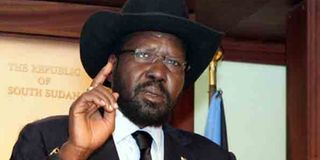TALKING POINT : Processes of electing Eala members devoid of democracy

President Salva Kiir Mayardit
What you need to know:
Having received feedback on my articles and following continuous monitoring of the recent election of representatives to the 54-member legislative organ of the regional bloc, I am of the view that processes in various member states leave a lot to be desired.
I have written in the past on shortcomings in the election by East African Community (EAC) member states of their representatives to the East African Legislative Assembly (Eala). The focus of my previous analyses was on the scope of public participation in the process of each EAC member nominating and electing its nine representatives to the assembly.
Having received feedback on my articles and following continuous monitoring of the recent election of representatives to the 54-member legislative organ of the regional bloc, I am of the view that processes in various member states leave a lot to be desired.
One only needs to recall the chaotic processes in Kenya and South Sudan to conclude that there is a need for urgent measures to address shortcomings in electing Eala members.
South Sudan, in particular, violated the principle of election of Eala members alongside two other rules. South Sudan’s nine representatives were not elected by that country’s parliament, but were appointed by President Salva Kiir Mayardit (pictured) in violation of Article 50 of the EAC Treaty.
Consequently, the act of confirming the members was equally flawed as it was ultra vires.
Thanks to South Sudanese citizen Wani Santino Jada, who challenged the infraction at the East African Court of Justice (EACJ), the appointments were invalidated and consequently revoked by the National Transitional Legislature in Juba.
A motion has been moved to withdraw parliamentary approval as a gesture of invalidating the entire process. What a mess!
By allowing the President to nominate the nine members instead of parliament electing them, South Sudan was in flagrant violation of Article 50 of the EAC Treaty. This is not to mention the fact that the presidential appointments breached the principle of gender parity as envisaged in the Treaty and Eala’s standing regulations.
At least four of each country’s Eala members are supposed to be women, but President Kiir nominated only two. How could the President’s advisors have overlooked such an important requirement? After bungling of epic proportions on the part of the Head of State, how on earth did the South Sudanese parliament go ahead and rubber-stamp the decision? Is the legislature in Juba performing its oversight role properly?
Furthermore, the appointments were at variance with several other principles. According to the EAC Treaty, Eala members must be broadly representative of the various political and social interests of partner states, including the opposition, women, people living with HIV/Aids and people with disability.
In contrast, the list submitted by President Kiir was composed mainly of Sudan People’s Liberation Movement (SPLM) apparatchiks and war veterans. There was hardly any member from the civil society or the private sector in the delegation.
It thus came as no surprise when the speaker of the South Sudanese parliament, Mr Antony Lino Makama, granted permission for the revocation of President Kiir’s appointments. Instead, a six-member committee has been constituted to educate South Sudanese lawmakers on Eala election rules and regulations, something that should have been done right from the outset.
If Juba prefers perfection, I recommend Tanzania’s Centre for Foreign Relations for civic literacy on Eala election rules as well as the workings of the EAC in general.
There were problems in Kenya too. The country had until very recently been unable to elect its nine members to the regional assembly, thanks to political infighting and back-and-forth scuffling between the ruling Jubilee and opposition Nasa coalitions. The nomination of the son of Mr Kalonzo Musyoka, a key figure in the opposition, led to allegations of nepotism. On the other hand, Jubilee presented a list of 15 candidates for the coalition’s five seats. In another development, the opposition looked poised to present only four candidates for the four positions they are required to fill.
It did not help matters when the speaker of Kenya’s parliament, Mr Justin Muturi, issued a misleading clarification that there was no problem with sitting MPs vying for Eala seats without having to vacate their parliamentary seats.
This is a clear violation of the EAC Treaty. Unfortunately, Mr Muturi’s misleading advice inspired Mandera North MP Mohammed Noor to seek election to Eala, contrary to Article 50 (1).
This led to queries as to whether there was democracy in the process of electing Eala members in Kenya and elsewhere.




